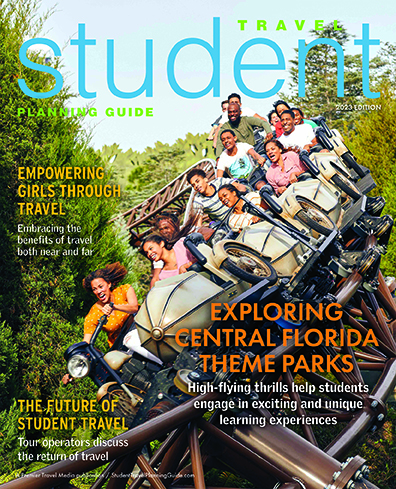Head outdoors and experience these four unique opportunities to engage with wildlife and explore our natural world
Welcome to the world of adventure with a purpose! For students who thrive in the great outdoors, we have compiled a list of four unique and educational activities that will inspire, challenge, and excite. From caring for Gray Wolves at a wildlife sanctuary in Montana to discovering the complexity of marine wetlands, these experiences promise to enhance your connection with nature and increase your passion for environmental conservation.
National Park Student Research Programs
The value of students visiting national parks extends far beyond the breathtaking landscapes and awe-inspiring wildlife. These protected areas provide invaluable opportunities for experiential learning, environmental education, and fostering a sense of stewardship towards our planet.
One brilliant educational program is the “Citizen Science in Action” initiative in the Great Smoky Mountains National Park in the Appalachian Mountains. Offering lush forests and cascading waterfalls, the Great Smoky Mountains has no shortage of fascinating material to study. This program invites students to participate in ongoing scientific research within the park, covering topics including wildlife monitoring, plant phenology, water quality assessments, and air pollution studies. For students passionate about ecological research and environmental conservation, this program is an exceptional stepping-stone into a lifetime of environmental advocacy.
The “Citizen Science in Action” initiative is one among hundreds operating across the national parks of the United States. Participating in the preservation of national parks allows students to develop a deep appreciation for the natural world and their own power in helping to protect it. These experiences create lifelong connections to nature and further instill a sense of responsibility for those looking to increase their enthusiasm.
Falconry
Falconry, also known as hawking, is an ancient practice of training predatory birds to hunt small prey. The trained bird, or “raptor”, is trained through a series of exercises that builds a deep bond between the bird and the trainer, or “falconer”.
Falconry is a unique and effective form of wildlife conservation. Primarily, it helps to maintain healthy populations of birds of prey and small game. These birds are critical for the health of their ecosystem, and the tactical utilization of their hunting instincts to further manage populations of rodents or small birds reduces the need for human intervention into imbalanced or unhealthy ecosystems. Falconry helps manage population problems in a natural manner, limiting the influence of humans upon an area. Participating in a falconry program offers a student passionate about conservation a unique opportunity to deepen their understanding of wildlife preservation. By immersing themselves in this ancient art, students witness firsthand the symbiotic relationship between falconers and raptors, which provides a unique understanding into the psychology of these powerful animals. Learning about the myriad of sustainable practices that fuel these programs, gaining psychological connections with birds of prey, and developing practical skills for wildlife management equips students to become advocates for preserving biodiversity and protecting our natural world.
Wildlife Sanctuaries
Visiting wildlife sanctuaries offers students immeasurable value by providing up-close encounters with diverse species and fostering a deep appreciation for the life-force of different animals. These sanctuaries serve as crucial habitats for animals in need of protection and rehabilitation, which is an incredible opportunity to interact first-hand with the process of reintegrating animals to their homes. Students gain insights into the importance of preserving biodiversity and understanding human-wildlife interactions.
One exceptional program is the Grizzly & Wolf Discovery Center in Montana, dedicated to the conservation of grizzly bears and gray wolves. Students participating in the center’s educational programs gain immense value from first-hand encounters with these majestic creatures, dismantling misconceptions and gaining insight into the vast, complicated, and intelligent mental worlds of these predators. This program provides in-depth learning about these animals’ behavior, habitat needs, and challenges faced in the wild. This program encourages students to become ambassadors for the protection of these iconic species and advocates for sustainable coexistence between humans and wildlife.
The Grizzly & Wolf Discovery Center is just one of thousands of wildlife sanctuaries that offer student participation. Scattered across the country, these sanctuaries provide unparalleled access to the worlds of creatures working to return home. Sanctuaries foster uniquely temporary relationships between wildlife and humans and demonstrate the beauty of our ability to interact with wild animals on an even plane. A sanctuary will undoubtedly expand a student’s love for wildlife while carefully ensuring that the wild stays wild.
Swamp Tours
Dive (both literally and figuratively) into the mysterious world of swamps and wetlands; a beautiful, unique, and absolutely critical class of ecosystem. Swamp tours provide an exceptional opportunity to witness the delicate balance of flora and fauna, learn about the role of swamps in the global ecosystem, and get involved with conservation efforts.
One must-visit destination is the Everglades National Park in Florida, known for its vast expanse of sawgrass marshes and diverse wildlife. Visitors can explore the marshes on airboats or guided kayak tours, learning about the intricate web of life from above the surface. Snorkeling and diving tours allow students to enter into the underwater world and engage directly with an abundance of subterranean life.
Students who visit these ecosystems will open themselves up to the knowledge of the fragility and power of the wetlands, the role of swamps in carbon sequestration, and the need for conservation efforts to protect these vital ecosystems. Ultimately, those who visit will come away with a greater appreciation and closer relationship to a unique part of the natural world.
By Lucca Shields
For more great student travel inspiration to help you venture into the great outdoors, be sure to subscribe for FREE to Student Travel Planning Guide.






